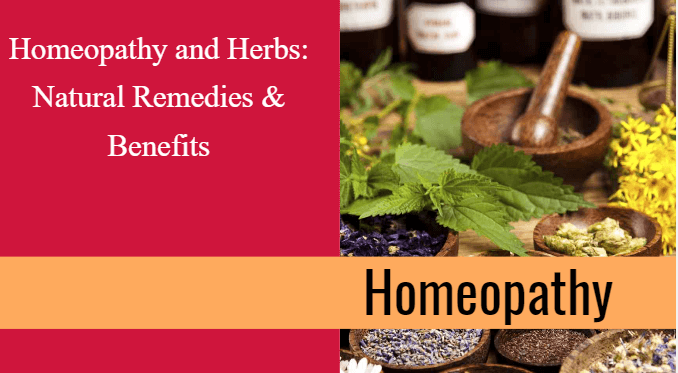Quick Overview
In a world increasingly embracing holistic and natural approaches to health, homeopathy and herbal remedies have gained significant popularity. These natural alternatives offer relief from common ailments and have been used for centuries to promote well-being.

Table of Contents
What is Homeopathy?
Homeopathy is a holistic system of medicine founded on the principle of “like cures like.” It is based on the idea that a substance that causes symptoms in a healthy person can be used in diluted form to treat similar symptoms in a person who is unwell. Homeopathic remedies are highly diluted substances, often prepared through a process of serial dilution and succussion (vigorous shaking).
Homeopathy is used to address a wide range of physical and emotional ailments, including allergies, colds, headaches, anxiety, and more. It is considered safe, non-toxic, and suitable for all age groups.
Read about: Exploring the Benefits of Tai Chi for Mind and Body
Benefits of Homeopathy
- Personalized Treatment: Homeopathic remedies are selected based on an individual’s specific symptoms and overall well-being, making it a highly personalized form of treatment.
- Minimal Side Effects: Homeopathic remedies are highly diluted and gentle, minimizing the risk of adverse effects.
- Holistic Approach: Homeopathy considers the physical, mental, and emotional aspects of health, addressing the root causes of ailments.
- Safe for All Ages: Homeopathy is safe for infants, children, adults, and seniors.
Common Homeopathic Remedies
- Arnica: Used for bruising, swelling, and pain, often associated with injuries.
- Nux Vomica: Effective for digestive issues, including indigestion, heartburn, and nausea.
- Chamomilla: Used for teething pain in children, irritability, and colic.
- Aconitum: Helpful for sudden onset illnesses, especially colds and fevers.
- Ignatia: Used for emotional distress, such as grief, anxiety, and mood swings.
Exploring Herbal Remedies
Herbal remedies involve the use of plant-based substances to promote healing and well-being. Different parts of plants, such as leaves, roots, stems, and flowers, are used to create remedies. These natural solutions have been a part of traditional medicine systems worldwide for centuries.
Herbs offer a holistic approach to health and wellness. They can be used for various purposes, including soothing minor ailments, boosting the immune system, and enhancing overall vitality.
Benefits of Herbal Remedies
- Natural Healing: Herbal remedies harness the natural healing properties of plants.
- Low Risk of Side Effects: When used as directed, herbal remedies generally have few side effects.
- Wide Range of Uses: Herbs can address a broad spectrum of health issues, from minor skin conditions to stress and sleep disturbances.
- Complementary Care: Herbal remedies can complement conventional medical treatments.
Common Herbal Remedies
- Echinacea: Known for its immune-boosting properties, often used to prevent or lessen the duration of colds.
- Lavender: Used to alleviate stress, anxiety, and insomnia. Lavender essential oil can be inhaled or applied topically.
- Ginger: Effective for nausea, motion sickness, and digestive discomfort.
- Peppermint: Relieves indigestion, headaches, and respiratory congestion.
- Chamomile: Known for its calming properties, often used to relieve anxiety and improve sleep quality.
How to use natural remedies safely?
It is important to note that natural remedies can have side effects, and they can interact with other medications you are taking. It is important to talk to your doctor before using any natural remedies, especially if you have any health conditions or are taking any medications.
Here are some tips for using natural remedies safely:
- Start with a low dose and increase the dose gradually as needed.
- Be aware of the potential side effects of each remedy.
- Avoid using natural remedies if you are pregnant or breastfeeding.
Talk to your doctor before using any natural remedies, especially if you have any health conditions or are taking any medications.
Questions
FAQs for Homeopathy and Herbs: Natural Remedies & Benefits
Q.1: What is homeopathy?
Homeopathy is a system of medicine that uses extremely diluted substances to stimulate the body’s natural healing process. Homeopathic remedies are made from a variety of natural substances, including plants, minerals, and animals.
Q.2: What is herbal medicine?
Herbal medicine is the use of plants to promote health and treat disease. Herbal remedies can be taken in a variety of forms, including teas, capsules, tinctures, and extracts.
Q.3: What are the benefits of homeopathy and herbal medicine?
Homeopathy and herbal medicine are often used as complementary and alternative therapies for a variety of conditions, including allergies, asthma, anxiety, depression, insomnia, and pain. Both homeopathy and herbal medicine are generally considered to be safe for most people, but it is important to talk to your doctor before starting any new treatment.
Q.4: How do I choose the right homeopathic or herbal remedy for me?
There are many different homeopathic and herbal remedies available, so it is important to choose one that is right for you. If you are new to homeopathy or herbal medicine, it is best to consult with a qualified practitioner.
Q.5: Are there any risks associated with homeopathy and herbal medicine?
Homeopathy and herbal medicine are generally considered to be safe for most people, but there are some potential risks. For example, some homeopathic remedies are made from poisonous substances, so it is important to dilute them properly before taking them. Additionally, some herbs can interact with other medications, so it is important to talk to your doctor before starting any new herbal treatment.
